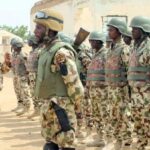
Nigeria’s corridors of power are again trembling under the weight of suspicion. President Bola Tinubu’s dramatic overhaul of the nation’s military command has ignited debate, fear, and whispers of betrayal within the ranks, days after reports of a foiled coup attempt surfaced.
On Oct. 24, the President dismissed General Christopher Musa, his Chief of Defence Staff, replacing him with General Olufemi Oluyede, formerly Chief of Army Staff. Major General Waidi Shaibu now heads the army, Air Vice Marshal Sunday Kelvin Aneke becomes the new Air Chief, and Rear Admiral Idi Abbas takes charge of the navy. Only Major General Emmanuel Akomaye Parker Undiandeye, Chief of Defence Intelligence, retained his seat — a notable exception in an otherwise sweeping purge.
A State House statement signed by Sunday Dare, Special Adviser on Media and Public Communication, claimed the changes were made “to strengthen Nigeria’s national security architecture.” But some Nigerians are taking the government’s explanation at face value.
The shake-up comes amid rumours of an attempted coup — reports that Tinubu’s administration has tried to downplay but cannot entirely dismiss.
Although the Defence Headquarters did not directly acknowledge any intentions of a coup, Brigadier General Tukur Gusau, a representative of the organisation, mentioned on Oct. 4 that 16 officers were being investigated for disciplinary issues and breaches of service protocols. This situation arose a year after Nigerians demanded a military intervention in response to escalating economic difficulties.
However, sources within Nigeria’s corridors of power have told HumAngle that more reshuffling will occur in the coming weeks as the Tinubu-led administration fights to maintain its grip on democratic power. The sources stated that amid ongoing investigations, the service chiefs were rejigged to fill the gaps in the military intelligence system.
Over 20 officers are now under detention following what officials described as “disciplinary breaches”. However, insiders suggest something deeper, pointing to a widening rift inside the armed forces and a purge disguised as reform.
“All the suspects are from one region,” a source familiar with the investigation said. “If this were really a coup, how could it have succeeded? What’s happening looks more like a purge than a coup plot. Perhaps they may be clearing the path for someone not yet in the picture.”
The officer added that growing grievances among northern officers have festered for months, notably since recruitment shifted from state-based quotas to geopolitical zones. “The north, which has three regions, has now been reduced to one,” another senior officer lamented.
For many within the ranks, the move feels political. Yet the government remains tight-lipped, neither naming nor prosecuting the detained officers. And “the evidence is sketchy,” one insider admitted. “In the end, what may happen is compulsory retirement for many of them, and rarely will there ever be a treason trial.”
Nigeria has experienced this troubling pattern in its history. The country’s modern timeline is marked by a series of military interventions, beginning with the first coup in 1966 and continuing through violent takeovers in 1975, 1983, and 1985, culminating in the Abacha dictatorship that suffocated the nation during the 1990s. Each coup was accompanied by promises of reform, yet the reality was one of repression, economic decline, and bloodshed.
What makes today’s situation chillingly familiar is the regional context. Across Africa, coups are no longer distant echoes of a troubled past; they have become resurgent realities. From Mali and Burkina Faso to Niger, Gabon, and now Madagascar, nine coups have shaken the continent since 2020, eroding democratic norms and emboldening soldiers who see themselves as saviours of failed civilian governments.
In Nigeria, where frustration is soaring over economic collapse, inflation, and insecurity, the thin line between democracy and disorder is wearing dangerously thin.
For President Tinubu, the latest reshuffle is both a desperate consolidation of power and an implicit admission of fragility. Analysts warn that internal divisions within the military, especially along regional lines, could prove explosive if left unchecked.
“There’s no better time to reform the armed forces than now,” one senior intelligence officer told HumAngle. “It’s far more important than even a constitutional review. We cannot afford a significant population bearing guns to remain aggrieved.” There are so many things wrong with the security sector that we must pay attention to, said the senior intelligence officer.
President Bola Tinubu’s overhaul of Nigeria’s military leadership, including the replacement of high-ranking officials, follows reports of a foiled coup attempt, creating tension and skepticism. The changes, which the government attributes to enhancing national security, come amid ongoing investigations of officers for disciplinary issues and suspected breaches, revealing a potential deeper rift within the military.
Sources suggest the shake-up may be politically motivated rather than a response to an actual coup, with regional grievances and recruitment policies igniting unrest among northern officers. The situation echoes Nigeria’s history of military interventions and coincides with a resurgence of coups in Africa. In response to economic and security challenges, President Tinubu’s actions appear as an effort to consolidate power while addressing internal military divisions.
